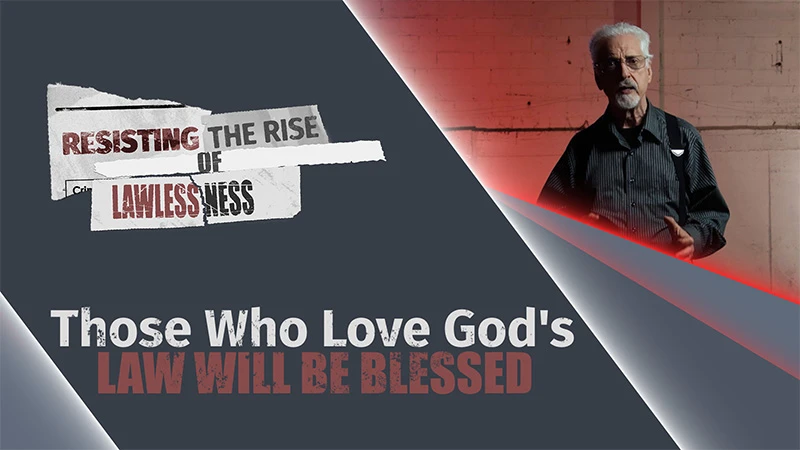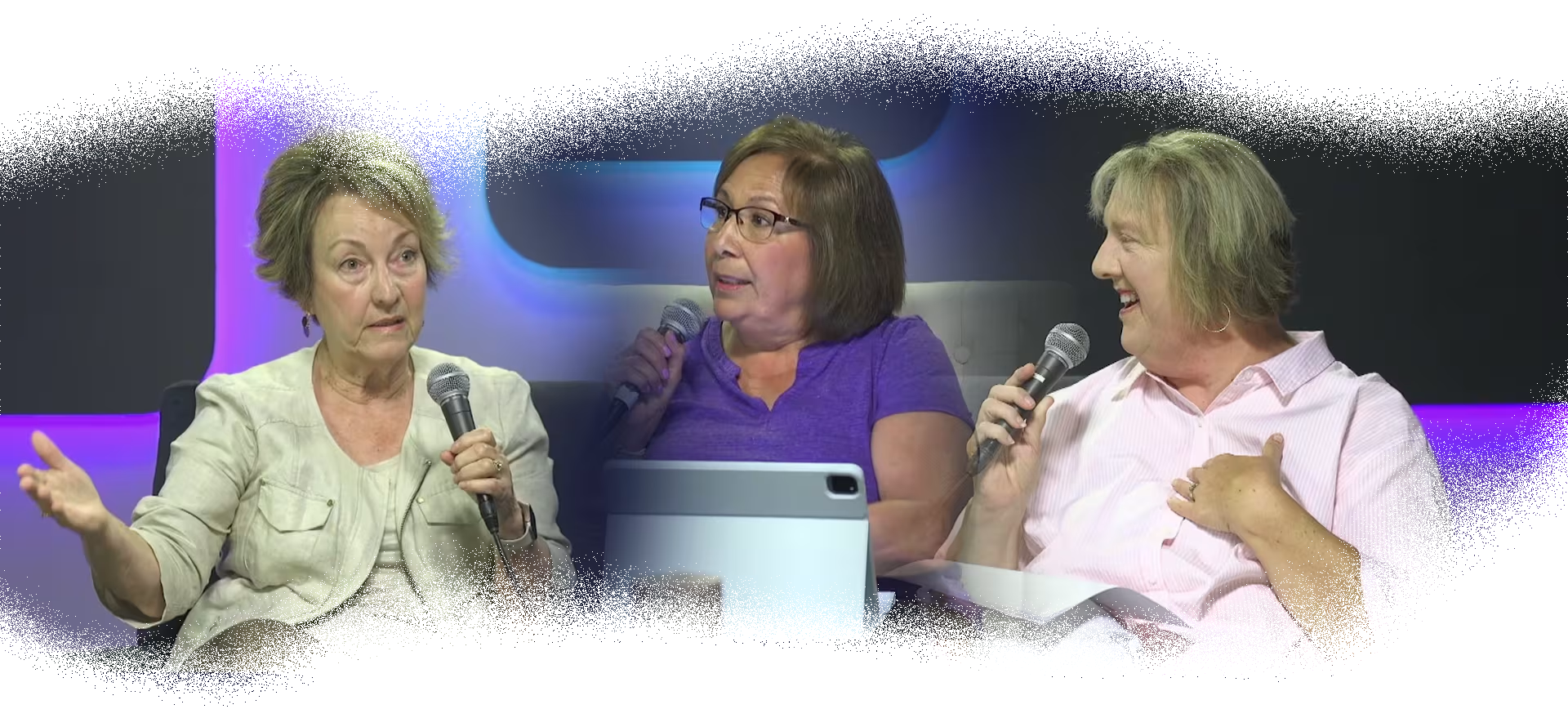
How the American Church Lost Her First Love
In the history of the Church, there have been times when she was far from the shining, burning lamp that she ought to be. Times when the fire of her devotion was so suffocated by a gospel of lies that it was little more than a smoking ember fighting for life in the midst of an icy spirit of ritualism, worldliness and compromise. What a contrast, then, were the powerful revivals of the First and Second Great Awakenings, the Welsh revival and the Hebrides awakening. The Holy Spirit of God would invade our world, bringing gut-wrenching repentance to men and women, sweeping drunkards and prostitutes, liars and thieves, hypocrites and backsliders out of the darkness and into the brilliant light of Truth.
Glenn and Jessie Meldrum were saved during such a revival, the Jesus Movement of the 60s and 70s. Since then, Glenn has preached around the country as an evangelist and pastor of several churches and Jessie has counseled and discipled many women. Both of them have seen firsthand the power of God’s Spirit in those who have truly taken up their cross to follow Jesus. But they have also watched in deep pain as this gospel of lies has once again slowly seeped into the church. They’re here with me in the studio because I want them to share their perspective on how this change took place. (From #402 - World of Lies: A Gospel of Lies)
So you guys are both saved in The Jesus Movement that took place in the '60s and '70s and I would guess that a lot of the people who are listening to our program at least are familiar with the name "Jesus Movement," but probably not familiar with the details. So I was hoping that you could start off by explaining what it was like to be in that revival, personally; what was it that made it so powerful a movement of God in our century?
Glenn: Well it was a real revival. I remember it sweeping through my high school and a lot of people getting saved. A lot of drug dealers and drug users got saved. The first time I went to this Jesus Freak church—I had just gotten save the day before in a park where I was partying—I went there, and I was raised Catholic, and I never felt anything like it. I couldn't have told you what it was, I couldn't have explained it, but He was there so real so powerful. It was a time where the presence of God was very real, very tangible, very powerful; In that church, I don't remember a service, for many years, where there wasn't somebody saved. I mean it was just normal Christianity for people to be saved —many times a lot of people saved. People would feel it driving by; they would be drawn to it and many times they would just turn around and come in when they see all the cars that were there. It was open from early morning till—sometimes we had to kick the people out—at one or 2 in the morning. Then be open again at 7 o'clock with young people just hanging out... Down the road from the church was a middle school and in one week over 100 kids got saved and what happened was the Spirit of God began moving in that school and kids on their own or in twos would walk—leave school walk down and come to get saved. So it was just a powerful move that was there.
Jessie: Being from a godless home, I never heard the gospel before and at 16 there was such an emptiness in me. But in my high school there were the Jesus freaks and most of them went to this church and when I saw them and would watch them, I just hungered for whatever it was that they had. They found something to fill that emptiness, and they were so filled with joy all the time, bubbling over in them. It was a lot of the people out of the hippie movement: drug dealers, drug users—these people were changed, I mean... they stopped the drugs, they stopped the drinking, you know— it was from darkness into light. So it got the attention of those like me that were looking for something, and we all knew—those of us who were watching the Jesus Freaks—we knew they went to this church, and I wanted to go so bad and the Lord new, and He just opened the door for me to go. I went to a Friday night youth service, and it was powerful, I never experienced anything like that. So it was the 1st time I heard the Gospel and I knew "this is it, this is what I've been missing." I went forward, came to Christ and have served Him since.
Yeah what you were just saying, that there was a real change in people, is one of the things that is really lacking in the church culture today. Pastor Steve in his interviews was looking at the decline of moral integrity and character across the board in American culture over the last 150 years, and especially since the '60s. What would you attribute the moral decline in the church to?
Glenn: Well that's a huge subject so it's not like you can say one thing for sure. I think we have a point of reference that we can look at with the 7 churches in the Book of Revelation in chapters 2 and 3. If you look at the 5 churches that the Lord rebuked, those are going to be dynamics that were in those churches that had caused the churches to sin and not live like they should. I think you could see all those prevalent today; I think the 7 churches all have expressions in individuals and then in the personalities of churches as well. You know with Ephesus; their problem was that they had forsaken their first love. They were busy, they had all kinds of activity, they had ministry, but they had fallen into dead religion and away from the relationship. Then you have other ones that are there that fell into sexual sins, and they let false prophets in. And then the last one in the list is Laodicea that just grew lukewarm. I would think that they're all tied back into the problem of Ephesus: forsaking your first love; when we love Jesus we're not going to be in sexual sins, we're not going to be lukewarm, we're not going to be in dead religion. There are so many dynamics that brought this about. Jesus said, "because wickedness will abound the love of many will grow cold." So what is it about "wickedness would abound" that would cause people to forsake their first love? And I think that's where it comes down to the things in Steve's book that he brings out: the sensuality, the business of life, the lies that are everywhere: news to schools to science and so on—all these lies that have permeated our culture that, ultimately, because wickedness does abound through that, it has affected the church. Rather than the church affecting the culture, we've allowed the culture to affect the church. So there's been this compromise, this lukewarmness, this forsaking of our first love, because there is so much business, so much activity and so much sensuality that people have not kept their heart and mind fixed on Christ.
{{blog-bbaby="/blog-ads-storage"}}
Jessie: When I see the decline of the church, I think people stopped understanding the necessity of prayer. E.M. Bounds explains conversion as "God taking a prayerless man and making him into a praying man." It's what should happen when we come into the kingdom: we become a people a prayer. It's one of the things that Jesus addressed that “my house is not a house of prayer anymore.” So it's like houses of prayer had become everything but. So I think the decline started when people thought prayer was optional. There is no way the church can be salt and light and hold back the darkness if it's not a praying church.
If someone in the Bible Belt say, who's totally a nonbeliever, but someone in the Bible Belt looks at the church—they would probably think that it's thriving because they would see churches on every corner; they see celebrity pastors; they see Christian bookstores and Christian radio stations. So it seems like there's all this activity; it seems like there's all this health, but it's a subculture—it's not true Christianity—it's just a subculture of people that have grown up around the church and one of the things that comes along with that subculture are pastors and teachers who are preaching and teaching a totally false message. If you were to talk to like a young believer who is just brand new, and you were going to warn them about false teachers what would you tell them to be looking for?
Jessie: I would warn believers to be careful of pragmatism—the whole idea that "something is big so it must be God." That is a very deceptive thought that people are drawn to something just because it's big, because there's a lot of activity. The question that every believer should ask in any church is, first of all, "is God here?" I mean "is God putting his stamp of approval on this? Is the word faithfully preached from the pulpit? Is that the Spirit of God there?" We should be able to sense the Holy Spirit in a place where He is and not be deceived by all the activity. Look at the lives of the leadership; are they are they living set apart for God? Do they have true life in God? There's just some much of the world that's in the church, and people need discernment.
Glenn: I guess I'd be firstly telling them to look for the Word of God. You know get themselves immersed in the Word of God. The only way we're going to know what lies are is we have to know what the truth is. So they need to know the Word and they need to understand it and not be defined by the cultural Christianity of today that sounds plausible and can use scriptures, but takes them out of context. Then as what Jesse was referring to: a life of prayer. The ability to truly discern what is true and false is going to be because of the relationship we have with Christ. Apart from that, we are not going to know. We can even have a list of false teachings, but if we don't have that right fellowship with Jesus, then we're not going to have the ability to really understand it or to stand against it.
I was sitting down with a pastor at a donut shop having coffee with him and talking. He was running a little bit late, and I saw a couple of Mormons and I knew they were Mormons and so it was only a little bit before they came over and were trying to talk with me. The problem is that even in Mormonism, they have changed their language, where they talk so Christian, but all their words have different meanings. Well that's what's happening in the compromised church: they say the same words, but they have different meanings with it. So if we don't know the Word of God, then we're not going to be able to understand the truth. So we have to go beyond the words that people are saying and understand what are they really meaning by that? So when one preacher says "grace," what does he mean by that? If we don't understand the word, then we're not going to comprehend that.
This book, "Walking in Truth in a World of Lies," obviously a huge bulk of the book is explaining the deceptions that are in the world, the deceptions that are in the church. And you've gone out to hundreds, thousands of churches in your over 20 years of evangelistic ministry, right? Have you found that in every church there are some people who are hungry for truth?
Glenn: According to the pastor and the message and the spiritual life of the church is going to be the percentage of people that are really saved. Every church is going to have the problem of some hypocrites and people that aren’t walking right and so it is going to be in the absolute best churches that are out there. But the percentage is going to be much smaller and when the gospel's not preached there, then the percentage of those who are real followers of Jesus going to get really small or nonexistent. We have seen over the years people that have had a hunger and, just like with the 7 churches I referred to, you could go to that individual church and you could almost pick out some of the people there. But there's going to be the Church of Philadelphia and Sardis, the ones who were praised. They're going to be there as well. So you can have these people that have a desire for God, a passion for Him and some that are just going along for the ride.
Jessie: Yes I think that there are, especially in the churches we minister in, people who are hungry for God and they're doing, scripturally, what they need to do to seek Him and find Him wholeheartedly. But one of the things that's very sad that we've seen is churches where, maybe there's a couple there, that kind of latched on to us and kept in touch over the years and the pastor would like not have us back after one or 2 times, but this couple would continue to correspond with us. And we could see, because of the number of years we've done this, we could see over time how they were dying… As the church declines because the pastor is lowering the standard, is just watering it down... you can't stay in an environment like that and not be affected by it. We know many people over the years that said, "well you know I know this church it's not really... they're not preaching a true gospel, but we're going to hang in there and hopefully we can be an influence," but they don't understand that year after year under this, you are going to die. So people have to be very careful.
Do you think that another revival is coming to America?
Jessie: On one side I don't see hope for a national awakening, but I do believe He's still a God of revival. As long as there's still grace, as long as mercy is still working, then perhaps He will pour out on communities and towns and little pockets where people are crying out, are seeking for a move of God. I can't stop praying for revival. It was what I was saved in and when you come into the kingdom that way, it's like you're always looking for it again; you're always crying out to the Lord because it's the only way multitudes will be able to come in. Those who are in the world that have no understanding of the gospel, it takes something like God stepping down, God doing a work in the land.
Glenn: I want to believe that there is. I'm very afraid... something is getting into America that is deeper and more sinister than people understand. I wrote an article and actually preached on it: called “Unredeemable.” And the whole premise of the article is showing that cultures can come to a place where they're unredeemable, so you have that in the days of Noah. The culture became unredeemable: all that was left was judgement. You have that with Sodom and Gomorrah and the 10 cities of the plain—they were unredeemable. You have the Amalekites in the days of Saul. You even have Israel itself, the northern kingdom of Israel was totally destroyed, and the southern kingdom was taken into captivity 150 years later, though they were able to come back. You have then even in the days of Jesus or after Jesus and 70 A.D. when the Roman general Titus came in, who eventually became emperor of Rome, he came and destroyed Jerusalem killing over a 1,000,000 Jews in the midst of it all. Jesus had warned, he said, "you did not know the day of God's coming to you," when He prophesied judgment upon them. So culture can become so evil that even a revival will not correct it and all that's left, then, is judgement. Where a culture comes; where it crosses that line, I can't say, but there are things that are going on in our culture that are so deep-rooted that are so deep-rooted within the church that I think becomes a major hindrance to a move of God, because now if people are going to repent it's not just having to change a little bit of their life, it's this total revolution, changing everything that they have and do the culture of their own life. So it's getting harder and harder for revival. In the decline of the church that's where you have hope for revival but—I don't know. Tozer ended up saying, and this would have been 70 years ago... 65 years ago, he says “if we have a revival of the type of Christianity we have today, it will take us 100 years to recover from it." And that's the problem, we don't need a revival of modern Christianity. If we have revival, we need a revival of Biblical Christianity, of New Testament Christianity; where it is a revolution, a spiritual revolution that grabs hold of people and transforms their life and then they live it out till the day they die.






.jpg)









